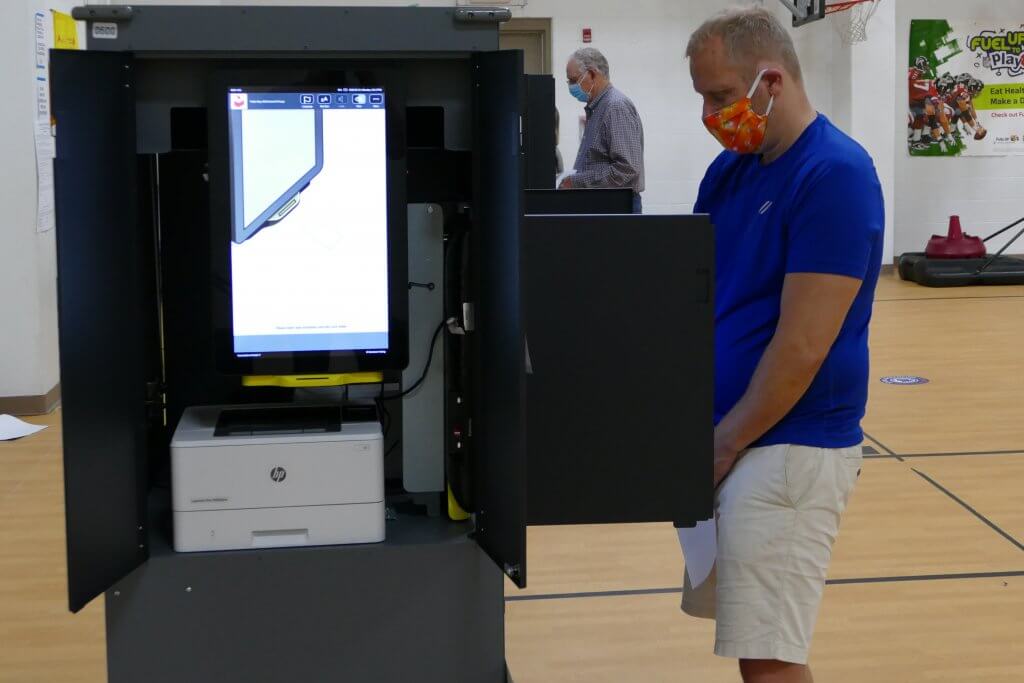
A U.S. District Court judge is expected to decide Friday if Georgia’s election officials need to stockpile many more emergency paper ballots at polling locations than the law now requires.
And that’s not the only unresolved legal challenge to the state’s election rules as Georgians prepare to cast ballots at precincts next week when early in-person voting begins in high-stakes elections to pick the next president, two U.S. Senators and resolve other races that will determine the state’s future direction.
Judge Amy Totenberg’s anticipated order might not even stand as the final word in the paper ballots case if the loser appeals. Voting rights activists in that case and others vow to press on with their legal fights in hopes they can change rules through last-minute court filings, judges’ decisions and appeals. Still, pending procedural lawsuits winding through Georgia courts with less than a month before Election Day seem unlikely to deliver substantive changes at this late date.
The emergency paper ballots battle is part of an extensive lawsuit in which election security advocates are asking the federal judge to order Georgia Secretary of State Brad Raffenspeger to shelve Georgia’s new electronic touch screen voting machines and switch to hand-marked paper ballots.
Wednesday a judge dismissed a lawsuit demanding election officials send Spanish-language ballot applications to voters in Gwinnett County, home to a large Hispanic population. The judge ruled the state is not breaking the law by offering only English-language applications. The groups that filed the suit said an appeal is possible.
And on Oct. 2, the 11th U.S. Circuit Court of Appeals restored Election Day on Nov. 3 as the deadline for absentee ballots to be received by county election offices after a federal judge earlier extended the deadline to Nov. 6. As of Thursday, the voting rights group New Georgia Project that sued had not appealed that reversal.
The flurry of court activity so close to Election Day is confusing for many Georgia voters, University of Georgia political science professor Trey Hood said.
“I can’t even keep up with all the court cases, much less for someone who doesn’t do this for a living,” Hood said. “You hear about, ‘Oh, well, the ballot deadline has been extended’ and then you don’t hear it’s not been extended, that it’s been reversed. At some point, it has to come to an end.”
Raffensperger said there isn’t enough time before Election Day to implement some of the changes courts are contemplating, including the recently rejected absentee ballot deadline extension.
Common Cause Georgia Executive Director Auanna Dennis says the organization believes it is important to press forward with election challenges, even with days before the first Tuesday in November running out.
Since January, the organization has pressed the state to provide more emergency paper ballots than the law calls for to back up the state’s new $104 million voting system in the event of technical glitches.
Common Cause hopes Totenberg will make counties keep enough paper ballots on hand to supply at least 40% of registered voters instead of the 10% the law calls for now.
Providing a backdrop for all the anxiety and legal activity focused on an election season that kicks into high gear next week are memories of long lines that plagued the June 9 primary. A record 5 million Georgians are expected to vote in the upcoming general election, the biggest test yet for the state’s new voting system.
“With the June primary, it was the perfect storm where we predicted that there would be all types of issues, and those issues did happen,” Dennis said. “There have been some remedies from the state to make our election system better, but it’s far from enough right now.”
Raffensperger dismisses the eleventh-hour legal maneuvering as shortsighted, making it more challenging for officials to run an election. He points to the Democratic Party of Georgia’s push to increase the font size on absentee ballot envelopes in Gwinnett as more of a hindrance than a help to voters.
“This is why elections administration 101 is to not change the rules in the middle of the game,” Raffensperger said. “Georgia’s elections staff and poll workers have a large enough task ahead of them executing an election during a pandemic without shortsighted and uninformed activist lawsuits burdening them with impractical bureaucratic hurdles. These activists opened Pandora’s Box with their frivolous lawsuits, demanding what they characterize as small changes that in reality have damaging and far-reaching consequences.”
Most pending election lawsuits are likely to linger well past the point when most November election results are certified. Even if Common Cause succeeded in securing a favorable ruling before Nov. 3, providing paper ballots for every voter to mark by hand in such a tight timeline isn’t feasible, Hood said.
He said Georgians participating in the election in the middle of a pandemic need to try to tune out all the legal wrangling and other noise and focus on what they can control: Voting in-person during the three-week early voting period, on Election Day, or by casting their absentee ballot by mail at least seven days before the Nov. 3 deadline.
“We’ve had elections many times, and there is this pandemic, but we’re gonna get through this,” Hood said. “It’s not the first time we’ve ever had a statewide election.”
This article appears in partnership with Georgia Recorder







